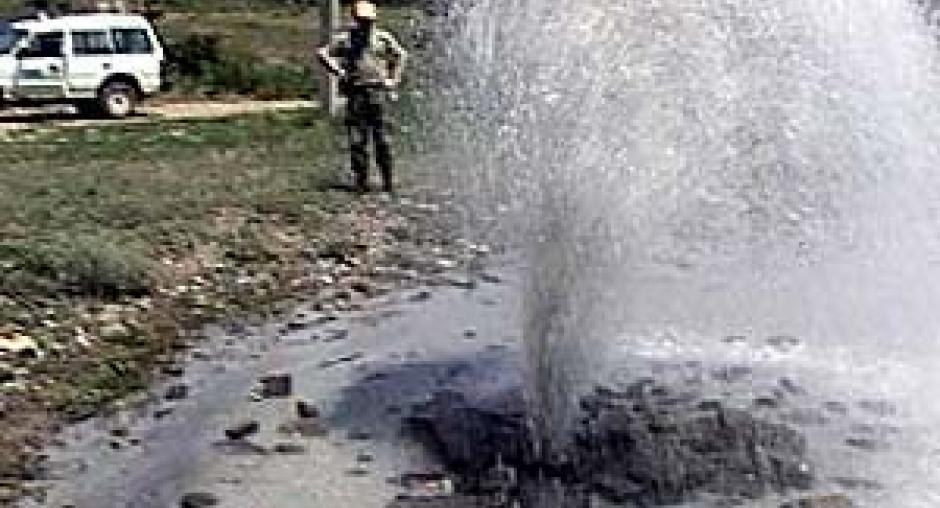Newsroom
Water for Life: OSCE supervises irrigation canal restoration in Georgian-Ossetian conflict zone
TBILISI 12 September 2002

The OSCE Mission to Georgia previously supported repairs of an irrigation canal near Tskhinvali in return for voluntary handover of arms and ammunition. (OSCE/Mission to Georgia) Photo details
TBILISI, 12 September 2002 - Repair work on a 30-kilometre irrigation canal system that runs through Georgian and Ossetian villages in the conflict zone has been successfully concluded. The canal has been handed over to Georgian and Ossetian residents living in the vicinity.
The repair was part of a programme under which the OSCE Mission to Georgia helps to address the basic community needs of people in return for their voluntary handover of arms and ammunition.
Supervised by the OSCE Mission to Georgia, the project was a joint effort with the British Department for International Development.
"The Kekhvi-Vanati irrigation system is an example of the timely response of an international donor - in this case the United Kingdom," said Hans Wesseling, member of the OSCE Mission to Georgia at the official opening of the channel. "The OSCE is pleased to have completed this successful project."
Under the voluntary handover-programme of the OSCE Mission, 1,320 units of arms and ammunition and 210 kg. of pure explosives have so far been handed over to the Joint Peace Keeping Forces (JPKF) in the conflict zone. More than half of it has now been destroyed by the peacekeepers. The project forms part of the joint efforts of the OSCE Mission and the JPKF Command to reduce the number of arms in the region.
"This project was implemented thanks to the collaboration of the local population - both Georgian and Ossetian villages took part. It would be of mutual benefit for them to maintain it," said Wing Commander Andrew Kerr, British Defense Attaché. "In the future, fish can be put into the water reservoir that is being used already as a swimming pool," added Wing Commander Kerr. A supply of fish can help secure food supplies in the zone of conflict for both Georgians and Ossetians.
The repair was part of a programme under which the OSCE Mission to Georgia helps to address the basic community needs of people in return for their voluntary handover of arms and ammunition.
Supervised by the OSCE Mission to Georgia, the project was a joint effort with the British Department for International Development.
"The Kekhvi-Vanati irrigation system is an example of the timely response of an international donor - in this case the United Kingdom," said Hans Wesseling, member of the OSCE Mission to Georgia at the official opening of the channel. "The OSCE is pleased to have completed this successful project."
Under the voluntary handover-programme of the OSCE Mission, 1,320 units of arms and ammunition and 210 kg. of pure explosives have so far been handed over to the Joint Peace Keeping Forces (JPKF) in the conflict zone. More than half of it has now been destroyed by the peacekeepers. The project forms part of the joint efforts of the OSCE Mission and the JPKF Command to reduce the number of arms in the region.
"This project was implemented thanks to the collaboration of the local population - both Georgian and Ossetian villages took part. It would be of mutual benefit for them to maintain it," said Wing Commander Andrew Kerr, British Defense Attaché. "In the future, fish can be put into the water reservoir that is being used already as a swimming pool," added Wing Commander Kerr. A supply of fish can help secure food supplies in the zone of conflict for both Georgians and Ossetians.
